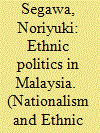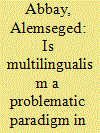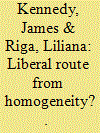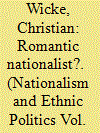|
|
|
Sort Order |
|
|
|
Items / Page
|
|
|
|
|
|
|
| Srl | Item |
| 1 |
ID:
121412


|
|
|
|
|
| Publication |
2013.
|
| Summary/Abstract |
This article examines the direction of ethnic politics in Malaysia by investigating the 2008 election results and the subsequent political maneuverings of political parties following the election. The results do not clearly demonstrate the demise of ethnic politics; however, the communal political paradigm of the Barisan Nasional Party (BN) has become increasingly ineffective in its attempts to appease both Malay and non-Malay communities. Following the election, the BN seems to have moved towards the adoption of a multiethnic agenda, whereas its affiliated parties have chosen to maintain their communal political paradigm. Furthermore, the Pakatan Rakyat has not outlined a clear multiethnic platform and has failed to reject communal politics. The Malaysian political paradigm has yet to shift qualitatively away from ethnic politics.
|
|
|
|
|
|
|
|
|
|
|
|
|
|
|
|
| 2 |
ID:
121413


|
|
|
|
|
| Publication |
2013.
|
| Summary/Abstract |
In Ethiopia, the promotion of Amharic by state nationalism was one of the factors that engendered counternationalisms such as the Eritrean secessionist movement. However, a free market of languages along with the domestication of English can contribute to managing/resolving communal conflicts and can usher the country into the global era. Such a liberal language policy does not jettison vernaculars; on the contrary, it permits them unlimited space to coexist or compete with one another and with English for primacy. Amharic will remain primus entre pares in the foreseeable future. However, the free market will catapult one or more of the major languages in the country as well as English to an official status, keeping the vernaculars for their emblematic values.
|
|
|
|
|
|
|
|
|
|
|
|
|
|
|
|
| 3 |
ID:
121410


|
|
|
|
|
| Publication |
2013.
|
| Summary/Abstract |
This article explores how key US policymakers' understandings of nationalism contributed to core tensions in Bosnia's Dayton Peace Accords. Drawing on in-depth interviews with some of Dayton's key architects, our findings suggest that US elites drew on a cluster of entwined social knowledge claims about (ethnic) nationalism and the possibility of its liberal accommodation. US policymakers' social knowledge was anchored around two key liberal beliefs: a Millian acknowledgement that territorial homogeneity would facilitate political stability and liberal governability; and a countervailing normative desire to liberalize ethnic nationalisms through the imposition of liberal-legalist frameworks.
|
|
|
|
|
|
|
|
|
|
|
|
|
|
|
|
| 4 |
ID:
121411


|
|
|
|
|
| Publication |
2013.
|
| Summary/Abstract |
In the period after 1999, the international community abrogated Serbia's sovereignty over Kosovo. It took responsibility for governing Kosovo and actively supported the development of autonomous Kosovar government institutions. Simultaneously, the Serbian authorities immediately started to rebuild Serbian government institutions in the parts of Kosovo that hosted a Serbian majority population. This article analyzes how this situation of parallel governance affects ethnic boundary strategies in the village of Gracanica, the largest Serbian village in central Kosovo. The article is based on evidence collected during fieldwork in Gracanica one year after Kosovo's declaration of independence in 2008. In this period, the Kosovar government implemented a decentralization program, which would transform Gracanica into a Serb majority municipality. Using Andreas Wimmer's multilevel process theory on boundary making, the article argues that in the period studied, "the scripts of action" concerning how to deal with the Kosovar government do slowly change, but this is largely a pragmatic response and Kosovo Serbs still identify themselves with Serbia. Important explanatory factors for these changing local dynamics are the changes in institutional structures (less Belgrade, more Pristina), the changes in (the balance of) resources offered by either government at the local level, the characteristics of the local political networks, and the weakness of local leadership.
|
|
|
|
|
|
|
|
|
|
|
|
|
|
|
|
| 5 |
ID:
121409


|
|
|
|
|
| Publication |
2013.
|
| Summary/Abstract |
This article analyzes the personal nationalism of Helmut Kohl, the so-called "Chancellor of Unity." The German politician acted as a (neo)romantic nationalist, who articulated his concept of nation in cultural and ethnic terms and as primarily detached from the idea of the nation-state. This kind of nationalism has been portrayed as something typically German and dangerous, as part of the nation's cultural Sonderweg outside of the West, where nationalism had taken a safer path. However, Kohl exemplified an ethnocultural representation of Germany that was reconciled with, and subordinated to, his liberal nationalism and his belief in the primacy of the West. Interestingly, his dialectic political rhetoric and biographical self-image demonstrates how romantic conceptualizations of German nationhood could be maintained after 1945, be structurally strengthened through the division of the nation during the Cold War, and that they have been part of the ongoing normalization process of German nationalism.
|
|
|
|
|
|
|
|
|
|
|
|
|
|
|
|
|
|
|
|
|